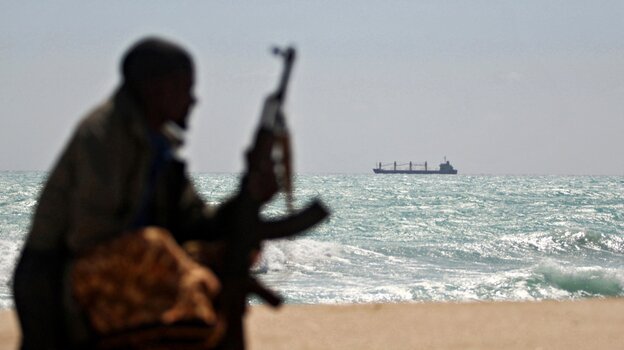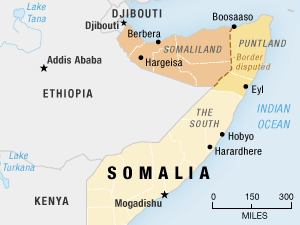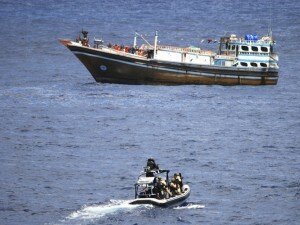Inside The Pirate Business: From Booty To Bonuses
The last in a three-part series.

Mohamed Dahir/AFP/Getty Image
In recent years, Somali piracy has grown into a multimillion-dollar criminal enterprise. Rarely a week goes by that pirates don’t attack or seize a ship.
Ransoms now average between $4 million and $5 million, and researchers estimate as many as 2,000 pirates operate from Somalia’s shores.
Law enforcement sources say the larger pirate syndicates are becoming increasingly sophisticated and professional. Last year, the coast guard in the Seychelles, an island nation in the Indian Ocean, found an 11-page, handwritten piracy contract in a seized skiff. Like many business ventures, the contract outlined everything from division of profits to an employee code of conduct.
There were even incentive bonuses.
Wayne Miller, a former police officer from Australia, spent last year teaching the Seychelles’ police how to interrogate pirates. Miller has seen the contract and said it divided ransom money into shares based on investors’ contributions to the operation.
“If they provided AK-47s or RPGs [rocket-propelled grenade launchers] or fuel, even the skiffs and mother ship, they were given a certain share that was quite high, and that ensured that whatever was made, the bulk would come back to them,” Miller said.
Bonuses And Penalties
Miller said ransom shares for pirate workers were divided between those who did the more dangerous jobs — hijacking on the sea — and those who did the safer tasks on land.
 “Shares on land would relate to taking care of hostages once they were taken ashore,” Miller said in an interview in Somaliland, an autonomous region of Somalia. “We noticed that the biggest share went to one particular person and my assumption is that would be the negotiator.”
“Shares on land would relate to taking care of hostages once they were taken ashore,” Miller said in an interview in Somaliland, an autonomous region of Somalia. “We noticed that the biggest share went to one particular person and my assumption is that would be the negotiator.”
The contract even outlined a pirate code of conduct. Pirates could not fight and had to obey the captain’s orders. If they broke the code, they forfeited shares. But the contract was not all stick.
“What was striking were bonuses for being first on board another ship,” said Miller.
One of [the pirates] told us he didn’t know his family was so big before he went into piracy — because now, all of a sudden, he had all these dependents running after him to get money.
- Stig J. Hansen, piracy researcher
Some of the habits of these pirates are very strange,” Hansen said from his home in Norway. “I encountered older pirates who were big failures, forgetting to tank enough fuel, doing rough things with their engines. You know, they’re not good at maintaining their skiffs at all.”
An Insider’s View
Shirwac, a pirate spokesman, says pirates’ biggest challenges today are foreign naval warships that he says are increasingly resorting to force. Shirwac, who asked that only his first name be used, works in the Somali town of Hobyo, a pirate lair on the Indian Ocean.

In this photo released by Dutch defense ministry, suspected pirates stand on deck with their hands raised as Dutch marines approach a hijacked Iranian fishing boat off the coast of Somalia on April 4.
Speaking by cell phone, he cited a case this month in which Dutch marines killed two of his fellow pirates in a shootout to free an Iranian fishing boat.
“We were talking to them on the phone. This was our own pirate militia,” Shirwac said. “They told us two of them were killed, four sustained injures and the remaining 12 were OK. They told us the marines had just jumped onto their boat. And that’s the last thing we heard.”
Somali pirates are hip to the Western media. Eager to spin a sympathetic tale, Shirwac claims pirates are really just aninformal coast guard that cracks down on illegal fishing and levies “taxes.”
“We are not pirates,” Shirwac insists. “We are the people guarding our coastline. The pirates are the people who invaded. They have come from over 5,000 miles away with warships and planes.”
But experts say the idea that pirates are environmental Robin Hoods is ridiculous.
Illegal fishing is a big problem around Somalia, and foreign trawlers have exploited Somalia’s internal problems for their own gain.

Inside The Pirate Business: From Booty To Bonuses by FRANK LANGFITT
But most of the pirate hijackings occur hundreds of miles off shore and most targets are cargo ships — even oil tankers — which have huge ransom values and nothing to do with fishing.
In the end, scholars like Hansen say Somali piracy is what it is: a high-stakes, high-risk business.
www.npr.or
Comments
comments
 Calendar
Calendar





































